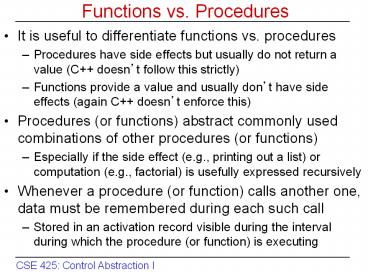Functions vs. Procedures - PowerPoint PPT Presentation
Title:
Functions vs. Procedures
Description:
Functions vs. Procedures It is useful to differentiate functions vs. procedures Procedures have side effects but usually do not return a value (C++ doesn t follow ... – PowerPoint PPT presentation
Number of Views:44
Avg rating:3.0/5.0
Title: Functions vs. Procedures
1
Functions vs. Procedures
- It is useful to differentiate functions vs.
procedures - Procedures have side effects but usually do not
return a value (C doesnt follow this strictly) - Functions provide a value and usually dont have
side effects (again C doesnt enforce this) - Procedures (or functions) abstract commonly used
combinations of other procedures (or functions) - Especially if the side effect (e.g., printing out
a list) or computation (e.g., factorial) is
usefully expressed recursively - Whenever a procedure (or function) calls another
one, data must be remembered during each such
call - Stored in an activation record visible during the
interval during which the procedure (or function)
is executing
2
Procedure Definition, Activation, Semantics
- Actions taken by a procedure/function form its
body - In C, the statements between the opening and
closing - Calling sequence ( prologue epilogue) sets up
calls to it - Also must store actual parameters and local
variables - Kept in activation record of the currently
running procedure - Temporary variables, return values, etc. also may
be there - Side effects may occur with non-local references
- E.g., updating a global variable or one passed by
reference - Two different environments must be considered
- Calling environment (provides values of formal
parameters) - Defining environment (provides values of external
variables) - In C/C, only formal parameters can be used to
communicate between calling and called
environments (!)
3
Parameter Passing
- Pass by value copies (calling to called
environment) - In C, this may call a copy constructor (user
defined types) - A different location is used, no side effects of
local changes - Pass by reference aliases (same location in both)
- Local changes to by-reference parameters ? side
effects - In C, can pass pointers by value (copies them)
- Local changes to the passed pointer (i.e.,
changing where it points) do not affect (where)
the original pointer (points) - However, the copied pointer and the original
pointer point to the same location, so
dereferencing either of them gives a reference to
the same location (if changed ? side effect) - Other variations pass-by-name, in/out parameters
- Support lazy evaluation, type checking direction
of updates
4
Environments, Activation, Allocation
- Fully static environments (e.g., Fortran 77)
- Activation records all known in advance
- Can lay out and link all activation records for
all calls - Limited, since recursion, etc. are off-limits in
that approach - Stack based run-time environments (e.g., C or
C) - Need a stack on which activation records are
pushed / popped (linked / unlinked) as functions
are called and return - Need environment pointer (ep) to current
activation record - Need instruction pointer (ip) into the code for
the procedure - Closure ltep, ipgt gives code, resolves non-local
references - Fully dynamic run-time environments
- Reclaim unreachable activation records (e.g., via
reference counting, mark-and-sweep, or
generational collection)
5
Dynamic Memory Management
- Languages that make functions/procedures first
class require fully dynamic memory management - Stack semantics cannot correctly express all
scenarios - Need garbage collection (as well as maintaining
free space which is needed even with C
malloc/free, C new/delete) - When memory is returned to heap, need to coalesce
- Adjacent free regions are joined into a larger
free region - Compaction (expensive) can reduce (external)
fragmentation - Buddy approach (Knuth) allocates blocks sized 2n,
trades off internal fragmentation for fast
non-fragmenting coalescing - Need to determine when and how to collect garbage
- Ref count eager, simple (expensive?) misses
cyclic garbage - Generational mark/sweep cleans up transient
garbage
6
Generics
- Implicit parametric polymorphism can enhance
reuse - Allows code to be parameterized with incomplete
types - Type checking may be deferred until run-time
(e.g., in Lisp) - Generics offer an alternative with earlier type
checking - Write exemplars (templates in C) with type
parameters - Constraints inferred/checked at compile time
instantiation - E.g., Titerator type for a (container) template
parameter T - Can be closely integrated with the language as a
result - Instantiation may be explicit or implicit
- E.g., vectorltintgt vs. swap(a, b) in C
7
Todays Studio Exercises
- Well code up ideas from Scott Chapter 8.1-8.4
- Looking at control abstraction for
functions/procedures - Todays exercises are again in C
- Please take advantage of the on-line tutorial and
reference manual pages that are linked on the
course web site - As always, please ask us for help as needed
- When done, email answers with subject line
Control Abstraction Studio I to
cse425_at_seas.wustl.edu































